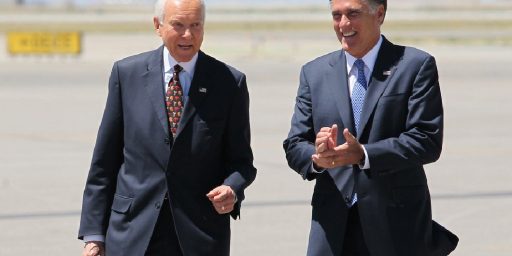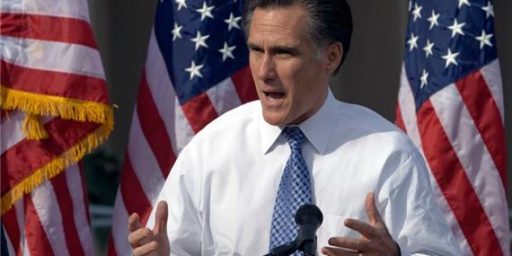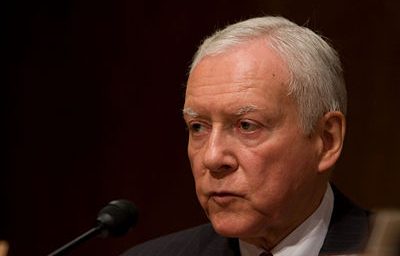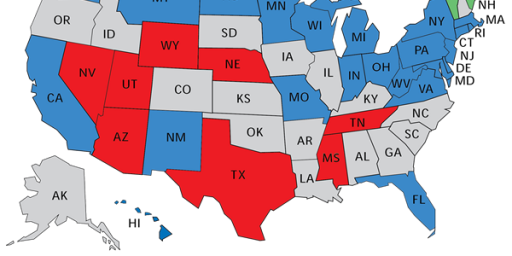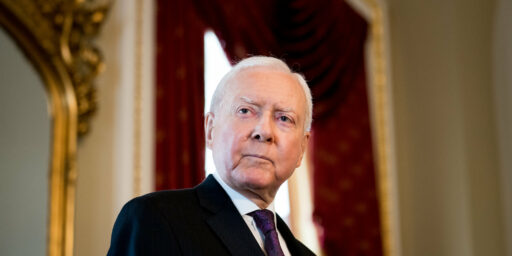The Real Crime is What’s Legal
Congressmen running for re-election routinely tout all the money they’ve brought to the district and presidents love to personally hand out disaster relief funds during election season. While unseemly, that’s just the way the game is played. Marisa Taylor and Kevin Hall report that something a little more fishy has been going on, though, in recent years:
Top Commerce and Treasury Departments officials appeared with Republican candidates and doled out millions in federal money in battleground congressional districts and states after receiving White House political briefings detailing GOP election strategy. Political appointees in the Treasury Department received at least 10 political briefings from July 2001 to August 2006, officials familiar with the meetings said. Their counterparts at the Commerce Department received at least four briefings — all in the election years of 2002, 2004 and 2006.
The House Oversight Committee is investigating whether the White House’s political briefings to at least 15 agencies, including to the Justice Department, the General Services Administration and the State Department, violated a ban on the use of government resources for campaign activities. Under the Hatch Act, Cabinet members are permitted to attend political briefings and appear with members of Congress. But Cabinet members and other political appointees aren’t permitted to spend taxpayer money with the aim of benefiting candidates.
[…]
Administration officials denied that any Treasury and Commerce events were orchestrated to help the Republican Party win elections. The officials said White House aides who briefed the departments were careful not to encourage the appointees to act on behalf of the Republican Party on government time.
Given the Politicization of Everything that has been an ongoing trend during the last quarter century or so and that has been taken to a high at form by Team Rove, it’s more than reasonable to start with the assumption that something not quite right was happening here. Indeed, the only reasons for skepticism is the vagueness of the report and the relative infrequency with which this reportedly happened.
If Rove figured out as early as July 2001 that some advantage could be reaped from giving political strategy briefs to appointees at Commerce and Treasury, it’s really odd that he would only do it nine more times over the next six years.
Otherwise, a couple of things should be kept in mind. First, before anyone gets their hopes up too awfully high, remember that violations of the Hatch Act are subject only to administrative penalties up to and including removal from office; it is not a criminal act.
Second, it’s perfectly legal for appointees (and most other federal employees for that matter) to “campaign for or against candidates in partisan elections.” Moreover, Senate-confirmed appointees and employees of the Executive Office of the President have been, since 1993, exempt from the general Hatch Act provisions prohibiting “engage in political activity while on duty, in a government office, wearing an official uniform, or using a government vehicle.” Indeed, that’s why Karl Rove can be paid from the public treasury while plotting political strategy.
This sort of thing, though, is more dicey:
In the months leading up to the 2002 election, then-Commerce Secretary Don Evans, Bush’s former campaign finance chairman, made eight appearances or announcements with Republican incumbents in districts deemed by White House aides either as competitive districts or battleground presidential states. During the stops, he doled out millions of dollars in grants, including in two public announcements with Rep. Heather Wilson, a New Mexico Republican in a competitive district.
[…]
In 2006, Evans’ successor, Carlos Gutierrez, and his aides also made public announcements with several Republican congressional incumbents, including in the battleground states of Missouri, Pennsylvania and New Mexico. Weeks before the 2006 election, Gutierrez and Congresswoman Wilson announced $3.45 million in grants for Albuquerque organizations. Also in the weeks before the election, a deputy secretary and Republican Sen. Rick Santorum announced that the department would be investing $2.25 million in Philadelphia.
The same year, then-Treasury Secretary John Snow and Santorum announced an award of millions in tax credits to Pennsylvania organizations. Santorum later lost his seat.
Snow and his aides also made appearances in 2006 with Republican incumbents or doled out grants in Virginia, Iowa and Ohio, states seen as crucial to the GOP retaining control of Congress.
Presuming those monies were allocated by Congress, politicizing their announcement is within the bounds of the law. The Hatch Act does not allow employees, even political appointees, to “use official authority or influence to interfere with an election.” It’s more than a stretch, though, to call handing out previously approved grant money at a rally for the incumbent Congressman interference. Indeed, no one would have batted an eye if Wilson made the announcement herself and a cabinet member wasn’t there.
Still, regardless of the technicalities of the Hatch Act, this is at least as unseemly as renting out the Lincoln Bedroom to big donors or making otherwise legal fundraising calls from the wrong room in the Vice President’s office, as Bill Clinton and Al Gore were criticized for doing during the 2000 campaign. It’s funny how quickly the things that were objects of scorn when done by opponents become good ideas when parties change office.

